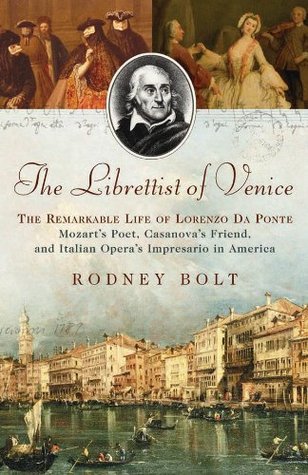Kindle Notes & Highlights
by
Rodney Bolt
Read between
October 27, 2017 - January 29, 2025
'obtain from the charity of others what I could not hope to gain from fatherly solicitude'.
She would bear him ten children.
within six months he knew Dante's Inferno by heart,
In the autumn of 1773, before the child was born, Da Ponte pocketed what was left of his forty-ducat salary, abruptly resigned from the seminary and left for Venice.
'illuminated by an eerie iridescence that nature rarely grants, and only to youth, and which normally disappears around age forty, after having worked miracles.
Venetians had long stopped seeing priests as models of high moral behaviour, and had themselves grown God-shirking and hedonistic.
The people give way to their passions quite naturally, then go to confession and begin all over again.'
even in penance planning sins anew.
'a paradise for friars and whores'.
among the first in Europe to have a decorated curtain lowered between acts.
In the absence of a court, Venice had produced the first public opera house,
she became known as 'the priest's whore'.
Lorenzo Da Ponte could not live for long without being in love.
– I would like to have all things that are good, genuine, and beautiful!
In effect, he desperately wanted to be liked by people he saw as his enemies, so overreacted to any rebuff with hate and suspicion, thus making himself unlikeable.
Mozart could once again make rich use of violas (for Don Giovanni in Prague he had been constrained by an orchestra with only two viola players, but the Burgtheater had a strong section). Anton Stadler and his brother, both virtuoso clarinet players, had joined the orchestra, helping to give respectability to what had previously been a wind-band instrument, and allowing Mozart a glorious palette of orchestral colouring. Così makes sumptuous use of the clarinet.
Casanova wrote that he had committed suicide, through overwork and disappointment: 'Although he did not do so intentionally, he killed himself nonetheless … What he pretended to know, but did not know, rendered what he did know useless, and the intelligence he sought spoiled the one he possessed.'
The critic Thomas Wilkes brought a similar dose of stolid English common sense to bear: 'The absurdity of managing the commonest matters of life by way of sing-song is glaring,' he wrote in his General View of the Stage. 'Who is there, in his right wits, that ever sung out his commands to his servants? or imparted, in that manner, a secret to his friend?'
he died toward the end of the year of indigestion after a particularly extravagant meal at the Spanish Ambassador's residence.
It has been composed for a different class of individuals;
Nancy, who was just sixty-two and in good health, died suddenly of pneumonia, after an illness of just six days.


